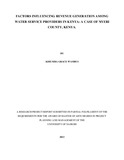| dc.description.abstract | This research study assessed various factors in water provision that influence revenue generation by Water Service Providers (WSPs) in Nyeri County. It explored service coverage, non-revenue water, metering ratio, staffing, and revenue collection efficiency of WSPs; as important efficiency parameters that impact on revenue streams. A WSP can improve on its financial standing and sustainability either by increasing it revenues or by reducing its costs. Improvement in operational efficiency may result in immediate increase in revenues or reduction of future investment needs, hence saving future capital investment costs. This research study was the case of all contracted WSPs in Nyeri County namely; Nyeri Water and Sewerage Company, Mathira Water and Sewerage Company, Othaya Water and Sewerage Company and Tetu Aberdare Water and Sewerage Company. The research methodology used a descriptive survey design and self-administered questionnaires were used as the data collection instrument. They were administered to utility managers identified through stratified random sampling. Interviews were carried out to collect additional qualitative data. Correlational and descriptive statistics through Statistical Package for Social Science (SPSS) were used to analyse data and present the findings of the study. The average water service coverage in the County was found to be below the acceptable sector benchmark. The study showed that the level of service coverage determines the amount of revenue generated by a WSP and by extension the resources available to the WSP to finance its operations. It was also clear that the high level of Non-Revenue Water (NRW) threatens the sustainability of the majority of WSPs in the County since they are losing slightly more than half of their water hence generating revenue from far much less water compared to production yet operation and maintenance expenditure continues to rise. The study also revealed high level of non-functioning meters and little regard to the impact of metering on revenues by WSPs.Effective collection systems and high revenue collection rates among the WSPs in the County were commendable given the direct relationship between collection efficiency and revenues found by the study. The low number in overall Staff Productivity Index (SPI) was indicative of high staff efficiency among the WSPs in the County. It is important for utility managers to understand how different operational parameters influence revenue generation by WSPs in order to realize and enhance commercial viability and financial sustainability of utilities in the water sector. By understanding the factors influencing revenues, policy makers both in government, non-government institutions and other development actors can find solutions to the problem of unviable water utilities and poor service provision. The current size of the consumer base as evidenced by the number of connections and service coverage has a direct bearing on the viability of WSPs.WASREB should therefore ensure that WSBs develop realistic investment plans targeted to achieve progressive increase in coverage; paying tribute to the fact that access to safe water in adequate quantity is a human right entrenched in the Constitution. More effort is required for a commercially sustainable water services sector that makes efficient use of avail-able resources. In this regard,WASREB should reinforce WSPs’ efforts towards 100% metering through provision of earmarked funds in tariffs. In order to improve on their collection efficiency, WSPs should enforce stricter collection policies while at the same time improve on their service quality. As measure towards improved staff efficiency, WASREB and WSBs should enforce the implementation of WASREB’s criteria for the employment of staff so that a higher level of skills and consequently capacity will be attained. For other researchers, the study has exposed areas for further research which will be useful for expanding knowledge in the Kenya water sector reforms. | en |

